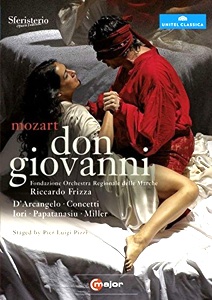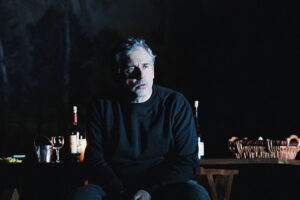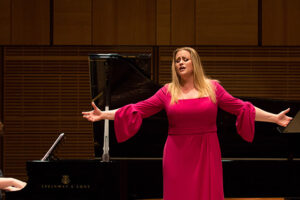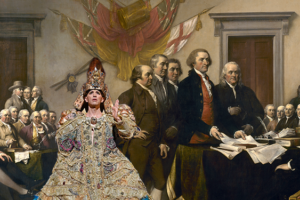
I always think of Don Giovanni as half of the greatest opera ever written. Or, actually, about 2/3 of the greatest opera ever written. The first act is a masterpiece of the operatic canon. There’s sex, there’s danger, there’s suspense, there’s humor, and there’s absolutely great music. And there’s also a wonderful sense of ambiguity—for instance, what exactly is Don Giovanni doing in Donna Anna’s bedroom? is it a rape, or something else? Is Zerlina really just a naive young thing? “Batti batti bel Masetto” has such an artificial, coy feel to it that you have your doubts. All of these events converge in the suspenseful Act One finale.
Act Two starts out with one of the greatest scenes ever composed… Don Giovanni “seducing” his wife Donna Elvira with the help of his servant Leporello who is also disguised as his master. The attraction Elvira feels towards Don Giovanni and the identity politics as Leporello crosses that upstairs/downstairs boundary is wonderfully subversive and sexy. Don’s seduction aria towards Elvira’s maid is simultaneously enchanting and chilling, as it echoes the melodies he used earlier in the opera. And then… the opera inevitably peters out somewhere in the middle of Act Two. The darkly comic elements fade away into a fairly straightforward morality play. There’s an endless succession of arias, all of which are beautiful musically but don’t really advance the plot forward, and by the time the sextet sings “Questo é el fin” I’m always semi-asleep.
How do opera directors handle the sudden transition from sexy/funny to preachy? In many cases, they don’t. They just let the music play out and Act Two doesn’t pack as much of a punch as Act One oh well. The new Royal Opera House production by Kasper Holten does a creditable job of handling many of the problems of Don Giovanni. He sets the opera in Victorian times. The set is a revolving unit of lots of doors and staircases (wow, we haven’t seen that before) with some slightly surreal projections, but Holten’s main “concept” is that Don Giovanni’s downfall in Act Two is not a literal death, but more a psychological isolation. The opera takes a big cut in the final sextet, but more importantly, all the voices are offstage, and the Don is cowering alone onstage. He hasn’t been pulled into the pits of hell. He’s just alone, which is… well, it’s a pretty accurate reflection of how most sociopaths end up in their lives.
Holten also makes the women of the opera conniving rather than victims. Giovanni and Anna’s relationship is presented as absolutely consensual. Zerlina is more mature than usual. Not the innocent young thing but a rather calculating old maid type. Only Elvira is sincere. Don Ottavio in this scenario of course becomes an even bigger tool than he usually is. Of course even Holten can’t make sense of the inertness of the second act, and the succession of static arias. He doesn’t do the common sense thing, which is cut “Mi tradi” as that aria is not in the Prague edition, and also makes absolutely no sense after “Il mio tesoro.” Instead, Holten cuts the final sextet to shreds, keeping only the cheery coda. Holten’s production is like a lot of Royal Opera House productions— earnest, thoughtful, not terribly exciting, but I guess it gets the job done.
His cast ranges is uneven. Maybe Mariusz Kweicien needs to give Don Giovanni a break? His voice has lost a lot of its silky luster, and his characterization isn’t very distinguished anymore. He’s not really sexy, funny, or charismatic—he’s a little of all of those things, but the sum is less than the parts. Alex Esposito steals the show as Leporello. He makes the character kind of a slimy sleazebag. Esposito doesn’t have the richest voice either but his characterization is A+. Antonio Poli is a wooden, unaffecting Don Ottavio, and “Il mio tesoro” sounds pushed and muscled. Dawid Kimberg was totally forgettable as Masetto. Alexander Tsymbalyuk (Commendatore) had perhaps the most impressive voice of the men, but his role is pretty brief.
Malin Bystrom (Donna Anna) is apparently the new Marina Poplavskaya, a beautiful icy blond, with an intriguingly cool timbre. Unfortunately, her upper register is a mess, and she shrieks her way through the role. “Or sai chi l’ónore” shouldn’t make your ears bleed. She also, despite her Grace Kelly looks is stiff and unconvincing onstage. Veronique Gens (Elvira) now looks very middle-aged and her voice has lost its lustre, but she’s still very musical and affecting. She alone among the women makes the character a real woman. Elizabeth Watts doesn’t look or sound like the typical Zerlina—she’s neither pert nor cute. More like an old maid who’s pretty desperate to put a ring on it. Her casting makes the Zerlina seduction seem less like the Don lusting after a pretty young thing and more like the Don going for an easy piece, but I’m not sure that as intentional on the director’s part. Nicola Liusotti leads a stirring account of the score in the pit but for some reason he insists on also playing the fortepiano and his accompaniment is sometimes off with the singers.
Another new September release
shows the big opera houses how Don Giovanni should be done. The performance was filmed at the “Steriristerio Opera Festival Macerata” in Teatro Lauro Rossi. It looks to be a tiny theater, and the stage is almost bare. Some walls that are also reflective mirrors, a small trap door that splits the stage into two levels, and a bed or table as props. That’s it. The costumes evoke the 18th century. Really a very barebones production. But the director Pier Luigi Pizzi gets things right— he personregie is thoughtful and convincing and every character comes alive. And the story made sense—the loose ends and ambiguity and changes of tone are just accepted. Pizzi doesn’t shoehorn Don Giovanni into being tragic, comic, sardonic, or preachy. He accepts that it’s all of the above.
Pizzi’s Don Giovanni is an intimate bedroom drama. Everyone is oversexed, but it doesn’t feel sensationalistic. One of the major hurdles in presenting this opera is that the Don is supposed to be a sexy magnetic thing, but he doesn’t score during the entire three hour opera. Pizzi presents an intriguing reason why: his only real relationship is with Leporello.The two have a symbiotic relationship, a bond that is sexual and emotional, so when Leporello sings the catalogue aria, it’s creepy rather than funny. This master/servant relationship extends to the bedroom. Leporello is seen sexing up Elvira when the Don is tired of her, and this doesn’t look to be an isolated incident. In the final sextet Leporello does not join the others—he is shattered and alone without Don Giovani.
The cast doesn’t have the big names of the Covent Garden staging, but they are in every sense superior. For one, all the women sort of look alike. The Don clearly has a type—sexy brunettes. The acting is pitch-perfect, the chemistry between all the characters sizzling. Of course interest lags slightly in the second act—even Pizzi can’t get through that block of greatest hits unscathed—but overall the performance has a tautness, a vision, and clarity that so many Don Giovanni productions lack.
Ildebrando D’Arcangelo (Don Giovanni) and Andrea Concetti (Leporello) are fantastic. They’re both sexy and charismatic and the blend of their voices is uncanny. Marlin Miller (Don Ottavio) is a singer I’d never heard of before but he sings with a beautiful elegance and sense of line. Even Masetto (William Corró) is interesting. The women are just as strong. Myrtó Papatanasu (Donna Anna) can’t quite handle the punishing tessitura of the role but she’s way less shrill than Bystrom, and her Donna Anna is passionate and hot-blooded. This despite the Pizzi production taking a more orthodox approach to Donna Anna—the sexual attraction between Anna and Giovanni is more ambiguous, and the rape is presented as a “maybe.” Carmela Remigio (Elvira) and Manuela Bisceglie (Zerlina) are also very convincing. Bisceglie even managed to make me tolerate “Vedrai carino.” Conductor Ricardo Frizza leads a much leaner, more “HiP” performance than we’d see at the Metropolitan.
-
Topics: barihunk, dvd, kasper holten, mariusz kwiecien, pier luigi pizzi, review
parterre in your box?
Get our free weekly newsletter delivered to your email.

























Comments